Vintage Treasures: Pamela Dean’s Secret Country Trilogy
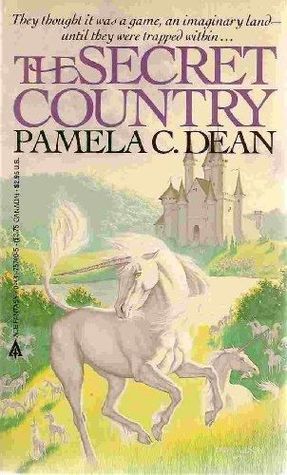 |
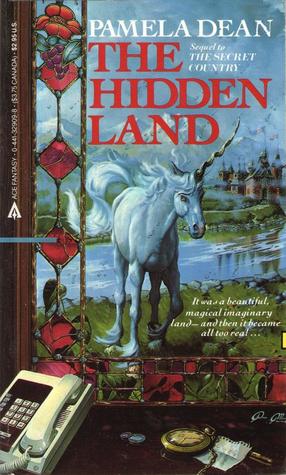 |
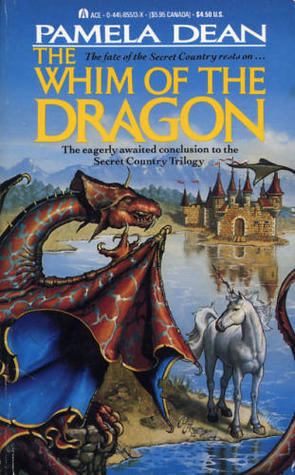 |
We’ve been talking a lot about the early days of Dungeons and Dragons recently, and that put me in mind of the early novels directly inspired by fantasy role playing. The most famous examples are probably Andre Norton’s Quag Keep (1979) and Joel Rosenberg’s long-running Guardians of the Flame series, starting with The Sleeping Dragon (1983).
Pamela Dean’s Secret Country Trilogy is another early example, although it’s not as well remembered today. It began with The Secret Country (1985), featuring a group of friends who become stranded in the fantasy realm they thought they had created.
Here’s the blurb from the back of the book:
The Secret Country was full of wizards, witches, unicorns, a magic ring, the Dragon King…
But then the Secret Country became real — the magic was real, the intrigue was real, the sharp edge of a sword drew real blood. The game was getting out of control…
Like a lot of trilogies at the time (and even today), it didn’t start out as a series. But the first book was successful, and The Hidden Land followed a year later, followed by The Whim of the Dragon in 1989.
One thing I found unusual about these books was the fact that the text on the back was almost identical for all three. It varied at least a little by the time the third one came along:
The Land of Unicorns was just an imaginary place…
They’d made it up one day while enacting a fantasy role-playing game, and filled it with sorcerous creatures, enchanted swords, and dragon kings. Then they found the sword under the hedge, and the Secret Country became all too real. The magic was real, the swords drew real blood, and the Dragon King was their sworn enemy.
They’d barely escaped with their lives. And now, a message has come requesting their return. This time, to face the final dangers of… The Whim of the Dragon.
The Secret Country Trilogy was re-released by Firebird in 2003, with a set of matching covers by Steve Stone:
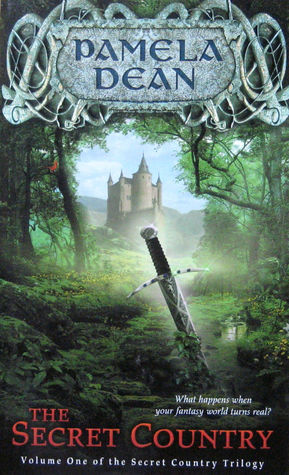 |
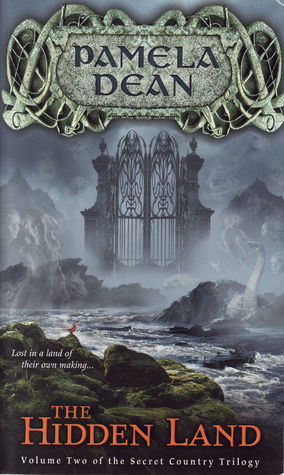 |
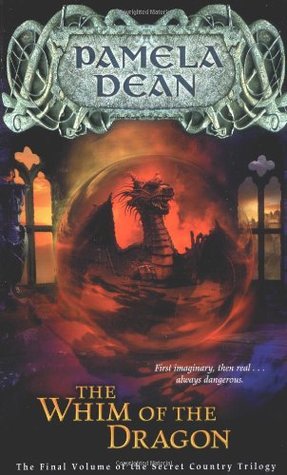 |
The series is currently out of print.
Since the late 80s there have been rumors about a fourth book, and recently Pamela Dean confirmed that Going North, the sequel to both The Whim of the Dragon and her 1994 novel The Dubious Hills, is a work in progress.
Pamela Dean’s most famous novel is perhaps Tam Lin (1991), a Scottish fairy story transplanted to a Minnesota college campus, which is still in print today.
The Secret Country, The Hidden Land, and The Whim of the Dragon were all published by Ace Books from 1985 – 1989, with covers by Dawn Wilson and Dean Morrissey.
See all of our recent Vintage Treasures here.
You mentioned Rosenberg’s series. Did you ever read Dennis L. McKiernan’s (Mithgar series) ‘Caverns of Socrates’? It had a similar premise, but virtual reality was the vehicle.
http://www.amazon.com/Caverns-Socrates-Dennis-L-McKiernan/dp/0451454677
And I just learned that there was a sequel last year, so I’ll be adding that to the ‘to read’ list.
Some of McKiernan’s Mithgar books are very good and he’s another topic I will get around to writing about some day.
BTW: McKiernan used to live here in Columbus. I looked up his number in the phone book one day, called and asked if I could get some books autographed.
He said to come to his house, signed a bunch of books and talked for an hour or two about other fantasy authors he liked (Andre Norton was discussed) and RPGing (he was into the ICE system rather than D&D).
Just an exceptionally nice guy.
Bob,
I read THE EYE OF THE HUNTER back in 1992, which I believe is part of the same series (although I didn’t realize it was a series until just now). I bought it chiefly for the gorgeous Keith Parkinson cover, perhaps the greatest representation of a D&D party in the middle of a dungeon I’ve yet seen:
http://www.blackgate.com/wp-content/uploads/2015/02/McKiernan-The-Eye-of-the-Hunter.jpg
And that’s a great story about meeting the man himself!
I read the first couple books in Rosenberg’s series shortly after they came out. I was a young adolescent who’d gotten seriously into D&D, so the premise seemed inviting, at the time, as pure wish fulfillment. I think I lost momentum because they turned out so grim — not quite what I would have wished for at all!
Decades later, I remembered the books, and what had initially turned me off struck me now as a potential strength: So you think you want to go have fun in fantasy land, eh? Well, here’s what it would really be like. Power, fame, glory? Sure. And watching your friends get mercilessly slaughtered. And, hey, you know when your character takes a hit and you have to erase 10 hp from your stat sheet? Now you get to feel what 10 hp translates to in actual pain. Have fun!
So I hunted down the first book again and began re-reading it. This time, I never finished, I think, because something about the writing or characterization struck me as weak. If I’m not mistaken, that was Rosenberg’s freshman outing as a novelist, though — so perhaps his writing improved in the sequels. I wouldn’t be surprised if I got around to giving them a third try. (That whole premise still holds a bit of escapist appeal to me.)
Anyway, I hadn’t heard about this series by Pamela Dean (those Firebird-issue covers are impressive!), nor the Andre Norton venture. If they all tap into this basic premise, which I don’t think has been overdone or fully tapped out, I might have to hunt them down too.
(In fact, that could make an interesting survey — take these three series that most notably use the “RPG-turned-real” premise and compare them. Are there any others that folks know of?)
> So I hunted down the first book again and began re-reading it. This time, I never finished
Nick,
Sadly, your experience mirrors my own. I read THE SLEEPING DRAGON when it was first released, thrilled to have a novel build on the premise of my favorite new game, but I never read any of the others in the series. Perhaps later books improved, but I found TSD too thin to really hold my attention.
> In fact, that could make an interesting survey — take these three series that most notably use the “RPG-turned-real”
> premise and compare them. Are there any others that folks know of?)
Hmmm… that WOULD make an excellent article. No other series come immediately to mind, though. Anyone else have any suggestions?
There was a Gamearth trilogy by Kevin J. Anderson.
It was reviewed in Dragon Magazine #147.
I read the first several Rosenberg books and liked them well enough at the time, but don’t have any particular desire to revisit them.
Quag Keep is … odd. Totally not what you’d expect just from the description.
I haven’t read the Secret Country books yet, but Tam Lin is _excellent_!!
> There was a Gamearth trilogy by Kevin J. Anderson.
Jeffro,
Good call! I was completely unfamiliar with the Gamearth trilogy, but it looks like a great addition to the list.
Did you ever read it? Can you recommend it?
> Quag Keep is … odd. Totally not what you’d expect just from the description.
Joe,
I’ve heard that. It wasn’t particularly popular when it came out, even among game fans, and still seems like a peculiar book.
> I haven’t read the Secret Country books yet, but Tam Lin is _excellent_!!
Thanks for the rec! It remains in print some 24 years after it was released – an amazing feat, so clearly you’re not the only one who thinks so.
She also did another one — Juniper, Gentian, and Rosemary — that I remember quite fondly. Modern fantasy about three sisters (high school age?) who are probably smarter than is, strictly speaking, good for them.
The sequel to Gamearth is reviewed in Dragon #151. John C. Bunnell comes down on it for both Anderson’s pacing with his reveals and for his inability to grasp what roleplaying games were actually like at the time.
Messing that sort of thing up can be awesome (see Tron portrayal of computers), here it sounds like it’d only be interesting in retrospect.
> She also did another one — Juniper, Gentian, and Rosemary — that I remember quite fondly
Joe,
Thanks. I’m not familiar with that series, but I’ll have to check it out.
Sometimes it seems the fantasy Dean writes (lands filled with unicorns and dragons) has gone starkly out-of-favor, replaced with dark and grim epic fantasy.
> John C. Bunnell comes down on it for both Anderson’s pacing with his reveals and for his inability to grasp what
> roleplaying games were actually like at the time.
Jeffro,
You know, that description jarred my memory enough to come up with another early novel about fantasy role playing come to life: Hobgoblin by John Coyne.
Unlike the others we’ve discussed, Coyne’s novel is a horror story (not fantasy). I haven’t read it, but I do recall that it was critiqued for a lack of real understanding of RPGs.
http://en.wikipedia.org/wiki/Hobgoblin_(novel)